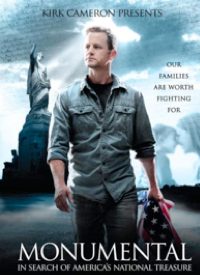
“Morally, you can go down to the mall or public school, sit down, and just be terrified by what you see,” he told Baptist Press News. “What used to be called shameful is now celebrated and normalized in the culture.”
On the spiritual side, “we’ve got ‘In God We Trust’ written on our money but the government is going around erasing anything having to do with God or Christ or Christian faith from monuments,” he said. “The separation of church and state is making teachers feel like they’re breaking the law if they mention anything about the faith of our forefathers. I am very concerned where the world will be in 10 years, 20 years, for the sake of my kids.”
Cameron, a former child television star in Hollywood, who is now a committed Christian, decided a couple of years ago to take a look back at the men and women who laid the foundations for America’s future, in an attempt to identify the characteristics they had that gave them the faith, courage, and perseverance to escape persecution and oppression in Europe, make a dangerous voyage to a new land, and lay down roots for their families and future generations.
What was the secret motivation in their hearts “that pushed them to risk their lives and their children for the sake of their future?” he wondered. “What principles did they use to ultimately wind up with a nation that has received more blessing, security, and prosperity than any nation in the history of the world?”
The result of Cameron’s search is the inspirational film Monumental: In Search of America’s National Treasure. The one hour and twenty minute documentary takes viewers on a journey between Europe and the United States tracing the footsteps and the motivations of both the Pilgrims and Founding Fathers in their quest to build America. The goal of the movie is to discover the ultimate source that inspired the nation’s founding generations, and to determine if concerned Americans can help guide their nation back to greatness.
For those searching for hope in the midst of the confusion and disarray that has marked America’s cultural and spiritual landscape over the past generation, Monumental offers a starting point worth exploring.
A good share of the movie focuses on the struggles of America’s Pilgrim forebears, beginning with their severe persecution in England, their efforts to escape by sailing to Holland, and their ultimate — and nearly disastrous — voyage to America and their establishment of the Plymouth colony.
“If anyone could understand what it was like to live in a tough spot as a nation it was the Pilgrims,” notes Cameron. Surrounded by severe persecution and danger at the hands of the government and church figures, the “separatists” as they were called, found faith and stability in Scripture when the first Bibles were printed in English.
Hated and tyrannized for their faith in a personal God, and for their insistence that all people — even the English Monarch — must abide by the laws of God as found in Scripture, a small band of around 100 of these worshippers ultimately escaped England, sailing for America where their Plymouth colony became the foundation for the nation under God that America was to become.
Cameron notes that even before disembarking from the Mayflower the Pilgrim Fathers established a covenant, called the Mayflower Compact, which served as a reminder that their endeavor was undertaken, overall, “for the Glory of God, and advancements of the Christian faith.”
Dr. Marshal Foster, head of the World History Institute, joins Cameron on a reflective visit to Plymouth, where they see firsthand where America’s forebears lived and died for the freedom that only undying faith in God can bring.
Foster relates that as the small group of Christian pioneers stumbled through their first bitter winter in Plymouth, their suffering was intense and over half of them perished. But even as spring came and the Mayflower ship captain begged the remaining sickly settlers to give up and sail back to England with him, they refused, having what Foster identifies as a “generational vision that they can lay their lives down in this wilderness and literally put their faces down in the mud and have their children walk on their backs to a better day.”
Cameron adds that these men and women “understood that throughout history God has always used a small group of people who were totally committed and ‘all in,’ and they knew that if they kept their covenant with God and with one another God would be faithful. This was the great experiment.”
In one particularly moving scene, Cameron stands with Foster at the site of the largest granite monument in the nation, situated in Plymouth, Massachusetts. Entitled the National Monument to the Forefathers, the 81-foot-tall monument, completed in 1889, is a testament to the principles that guided the Pilgrims as they established what would become one of the greatest nations in the earth’s history.
Central to the monument is the main heroic figure, “Faith,” whose right hand points toward heaven as her left hand clutches the Bible. Foster notes that America’s forefathers “knew that the only faith that could bring true liberty was a faith in the one true God and His Bible.”
Faith, in turn, is buttressed on the monument by the other principles the Pilgrims held dear — Freedom, Morality, Law, and Education — all of them reliant and subservient to faith in God and His Word. Foster points out that the massive granite monument represents the “Matrix of Liberty” to which America must return when she loses her way.
Some 150 years after the Pilgrims came the Founding Fathers, and David Barton, one of the foremost authorities on faith and America’s founding era, appears in the film to explain how the Founders drew on the dynamic faith of the Pilgrims in establishing the American republic.
Contrary to the insistence of a handful of modern historians, the Founders were not influenced by agnostic and atheist impulses, but realized from the beginning the deep need their new nation had for faith in God. Barton shows a family Bible from 1798, the publication of which was funded by a dozen signers of the Declaration of Independence or the Constitution, including John Adams and Thomas Jefferson. He emphasizes the priority the Founders placed on Scripture. “They wanted to get the Word of God out to every family,” Barton explains of their motivation. “It would make for a better country and better faith.”
Barton points out that Congress even arranged for the printing of the first English language Bible in the U.S., published in 1782, ultimately printing 10,000 of them. One of the stated purposes was to provide Scriptures for use in America’s schools. “The U.S. Congress was commissioning and printing Bibles to be given to all the people because they knew that would produce the character necessary to make America flourish and thrive,” says Cameron. He adds that men like “Benjamin Franklin and Thomas Jefferson understood that without Christianity you have no basis for a free and just nation, and that’s why they promoted the principles of Christianity, even if they were not themselves personal genuine followers of Jesus Christ.”
One of the experts Cameron calls on in the film is Christian author Os Guinness, who notes that the Founding Fathers “had a clear sense that there were three tasks to establishing a free society: you had to win it, you had to order it, and you had to sustain it.” He notes that the sustaining part “is this generation’s task, because that is the work of centuries, not just a few years.”
Guinness concludes that “there is nothing in today’s America that cannot be solved by genuinely going back to the American first principles” — meaning liberty founded upon faith in God and obedience to biblical precepts.
This is the point of Monumental, and what Cameron emphasizes as the film wraps up. “The solution to the crisis we’re in as a nation — economically, morally, and spiritually — is not to blame someone else,” he says. “The responsibility to secure freedom for my family lies in my hands…. The seed that grew this nation was faith in God. That faith produces character, a character that produces great courage — courage to self-govern, courage to guide and educate our children in the right world view, and the courage to elect today’s liberty men and women who will take the torch from our forefathers.”
While Monumental will enjoy only a brief run in the movie theaters, it has the potential to become a classic educational tool for students of liberty at every age level. Its message is clear and relevant: If America is to return to her former greatness, her citizens must look back and embrace its eternal foundations of faith in God and adherence to His Word.



